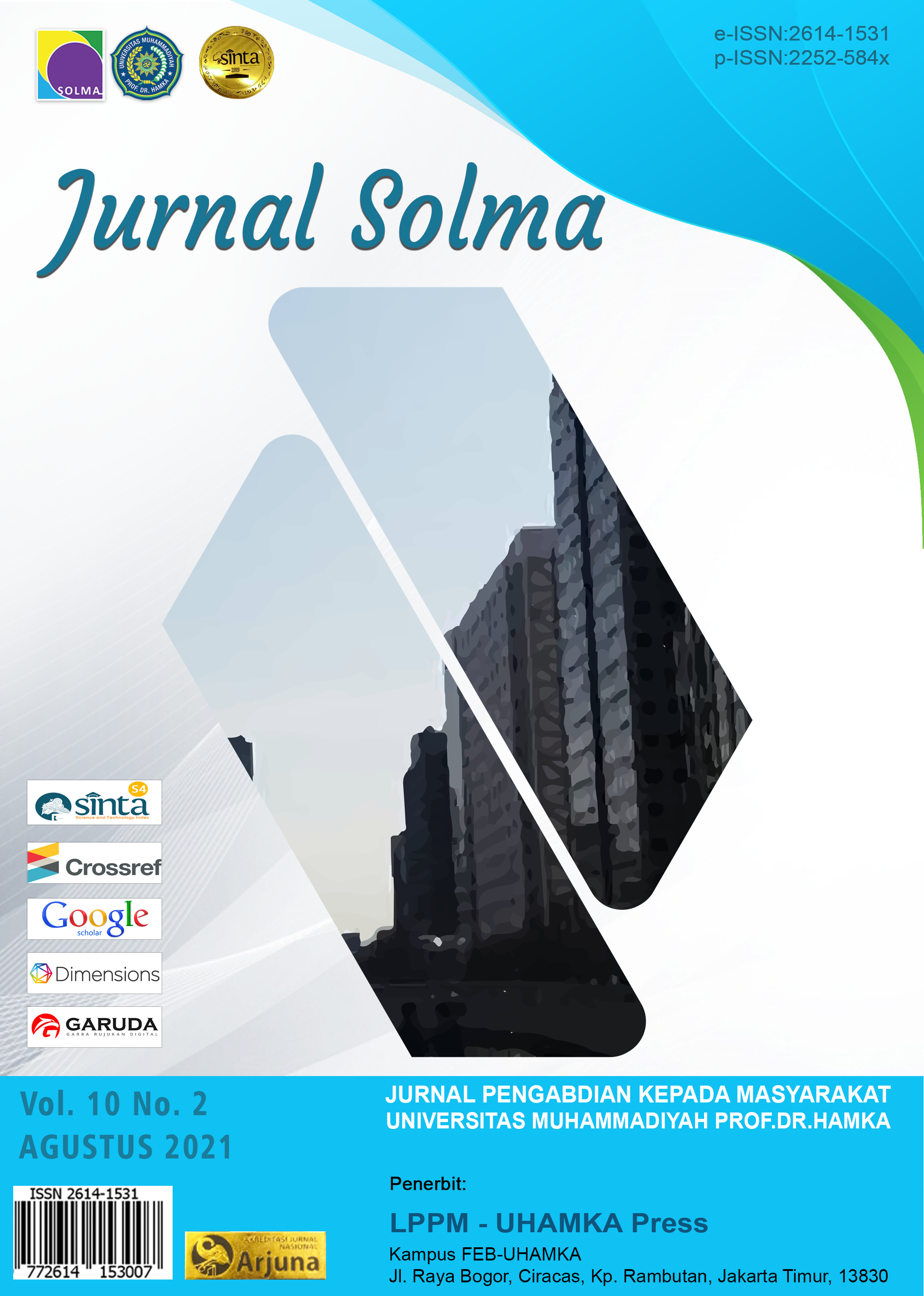Isi Artikel Utama
Abstrak
Background: Pendidikan inklusi adalah suatu pendidikan dimana anak yang berkebutuhan khusus dapat belajar di sekolah umum yang terdapat pada lingkungan sekitar mereka. Oleh karena itu, perhatian yang baik kepada siswa di sekolah inklusi sangat diperlukan untuk menunjang keberhasilan belajar mereka. Memberikan pendampingan pada Siswa Berkebutuhan Khusus (SBK) dalam pembelajaran matematika pada sekolah inklusi di kota Madiun. Metode: Mitra dalam pengabdian ini adalah SDN 2 Taman Kota Madiun, dimana kegiatan pengabdian diikuti oleh seluruh siswa kelas 4 termasuk SBK. Adapun metode pelaksanaan program meliputi tahapan-tahapan: persiapan, penyuluhan, penerapan, pendampingan dan evaluasi. Hasil: Siswa menjadi lebih termotivasi dalam mengikuti pembelajaran matematika. Siswa lebih mudah memahami materi (pecahan) yang disampaikan dengan bantuan media pembelajaran berupa alat peraga Rainbow Fraction Tower yang telah dikembangkan oleh tim. Kesimpulan: Pembelajaran matematika dengan bantuan media berupa alat peraga Rainbow Fraction Tower dapat memberikan pengaruh yang sangat baik bagi SBK, dimana mereka menjadi lebih termotivasi dalam belajar dan lebih mudah dalam memahami materi pecahan.
Kata Kunci
Rincian Artikel
© 2025 Oleh authors. Lisensi Jurnal SOLMA, LPPM-Uhamka, Jakarta. Artikel ini bersifat open access yang didistribusikan di bawah syarat dan ketentuan Creative Commons Attribution (CC BY) license. (http://creativecommons.org/licenses/by/4.0/).
Referensi
- Anggreni, T., & Asrori, M. (2013). Strategi Konstruktivistik Matematika Berbantuan Media Komputer Pembelajaran Segitiga Sebangun Kelas IX SMP Tunas Bangsa. Jurnal Pendidikan Dan Pembelajaran Khatulistiwa, 2(8).
- Aydisheh, F. H., & Gharibi, H. (2015). Effectiveness of Constructivist Teaching Method on Students' Mathematic Academic Achievement. Mediterranean Journal of Social Sciences, 6(6), 572–579. https://doi.org/10.5901/mjss.2015.v6n6s2p572
- Darma, I. P., & Rusyidi, B. (2015). Pelaksanaan Sekolah Inklusi di Indonesia. Prosiding Penelitian Dan Pengabdian Kepada Masyarakat, 2(2).
- Ekayani, P. (2017). Pentingnya Penggunaan Media Pembelajaran Untuk Meningkatkan Prestasi Belajar Siswa. Jurnal Fakultas Ilmu Pendidikan Universitas Pendidikan Ganesha Singaraja, 2(1), 1–11.
- Hasnawati, H., & Ardin, A. (2010). Efektivitas Penerapan Pembelajaran Konstruktivis terhadap Hasil Belajar Matematika. Jurnal Pendidikan Matematika, 1(2), 317654.
- Mulyati, T. (2016). Pendekatan Konstruktivisme Dan Dampaknnya Bagi Hasil Belajar Matematika Siswa SD. Edu Humaniora | Jurnal Pendidikan Dasar Kampus Cibiru, 1(2), 1–8. https://doi.org/10.17509/eh.v1i2.2738
- Peters, S. J. (2007). "Education for all?” A Historical Analysis of International Inclusive Education Policy and Individuals with Disabilities. Journal of Disability Policy Studies, 18(2), 98–108. https://doi.org/10.1177%2F10442073070180020601
- Prasetyowati, D. (2009). Efektivitas Pembelajaran Matematika Berbasis Humanistik dengan Pendekatan Kontruktivisme berbantuan CD Interaktif Materi Segi Empat kelas VII. AKSIOMA: Jurnal Matematika Dan Pendidikan Matematika, 4(2), 1–13. https://doi.org/10.26877/aks.v4i2/Septembe.546
- Rahmah, N. (2013). Hakikat pendidikan matematika. Al-Khwarizmi: Jurnal Pendidikan Matematika Dan Ilmu Pengetahuan Alam, 1(2), 1–10.
- Saguni, F. (2020). Penerapan Teori Konstruktivis Dalam Pembelajaran. Paedagogia: Jurnal Pendidikan, 8(2), 19–32. https://doi.org/10.24239/pdg.Vol8.Iss2.46
- Samaresh, A. (2017). Effectiveness of constructivist approach on academic achievement in science at secondary level. Educational Research and Reviews, 12(22), 1074–1079. https://doi.org/10.5897/err2017.3298
- Supardan, H. D. (2016). Teori dan praktik pendekatan konstruktivisme dalam pembelajaran. Edunomic Jurnal Pendidikan Ekonomi, 4(1), 1–12.
- Taylor, R. L., & Sternberg, L. (2012). Exceptional children: Integrating research and teaching. Springer Science & Business Media.
- Telaumbanua, Y. (2020). Efektifitas Penggunaan Alat Peraga Pada Pembelajaran Matematika Pada Sekolah Dasar Pokok Bahasan Pecahan. Warta Dharmawangsa, 14(4), 709–722.
- Thobroni, M. (2015). Belajar dan pembelajaran teori dan praktik. Ar-Ruzz Media.
Referensi
Anggreni, T., & Asrori, M. (2013). Strategi Konstruktivistik Matematika Berbantuan Media Komputer Pembelajaran Segitiga Sebangun Kelas IX SMP Tunas Bangsa. Jurnal Pendidikan Dan Pembelajaran Khatulistiwa, 2(8).
Aydisheh, F. H., & Gharibi, H. (2015). Effectiveness of Constructivist Teaching Method on Students' Mathematic Academic Achievement. Mediterranean Journal of Social Sciences, 6(6), 572–579. https://doi.org/10.5901/mjss.2015.v6n6s2p572
Darma, I. P., & Rusyidi, B. (2015). Pelaksanaan Sekolah Inklusi di Indonesia. Prosiding Penelitian Dan Pengabdian Kepada Masyarakat, 2(2).
Ekayani, P. (2017). Pentingnya Penggunaan Media Pembelajaran Untuk Meningkatkan Prestasi Belajar Siswa. Jurnal Fakultas Ilmu Pendidikan Universitas Pendidikan Ganesha Singaraja, 2(1), 1–11.
Hasnawati, H., & Ardin, A. (2010). Efektivitas Penerapan Pembelajaran Konstruktivis terhadap Hasil Belajar Matematika. Jurnal Pendidikan Matematika, 1(2), 317654.
Mulyati, T. (2016). Pendekatan Konstruktivisme Dan Dampaknnya Bagi Hasil Belajar Matematika Siswa SD. Edu Humaniora | Jurnal Pendidikan Dasar Kampus Cibiru, 1(2), 1–8. https://doi.org/10.17509/eh.v1i2.2738
Peters, S. J. (2007). "Education for all?” A Historical Analysis of International Inclusive Education Policy and Individuals with Disabilities. Journal of Disability Policy Studies, 18(2), 98–108. https://doi.org/10.1177%2F10442073070180020601
Prasetyowati, D. (2009). Efektivitas Pembelajaran Matematika Berbasis Humanistik dengan Pendekatan Kontruktivisme berbantuan CD Interaktif Materi Segi Empat kelas VII. AKSIOMA: Jurnal Matematika Dan Pendidikan Matematika, 4(2), 1–13. https://doi.org/10.26877/aks.v4i2/Septembe.546
Rahmah, N. (2013). Hakikat pendidikan matematika. Al-Khwarizmi: Jurnal Pendidikan Matematika Dan Ilmu Pengetahuan Alam, 1(2), 1–10.
Saguni, F. (2020). Penerapan Teori Konstruktivis Dalam Pembelajaran. Paedagogia: Jurnal Pendidikan, 8(2), 19–32. https://doi.org/10.24239/pdg.Vol8.Iss2.46
Samaresh, A. (2017). Effectiveness of constructivist approach on academic achievement in science at secondary level. Educational Research and Reviews, 12(22), 1074–1079. https://doi.org/10.5897/err2017.3298
Supardan, H. D. (2016). Teori dan praktik pendekatan konstruktivisme dalam pembelajaran. Edunomic Jurnal Pendidikan Ekonomi, 4(1), 1–12.
Taylor, R. L., & Sternberg, L. (2012). Exceptional children: Integrating research and teaching. Springer Science & Business Media.
Telaumbanua, Y. (2020). Efektifitas Penggunaan Alat Peraga Pada Pembelajaran Matematika Pada Sekolah Dasar Pokok Bahasan Pecahan. Warta Dharmawangsa, 14(4), 709–722.
Thobroni, M. (2015). Belajar dan pembelajaran teori dan praktik. Ar-Ruzz Media.

